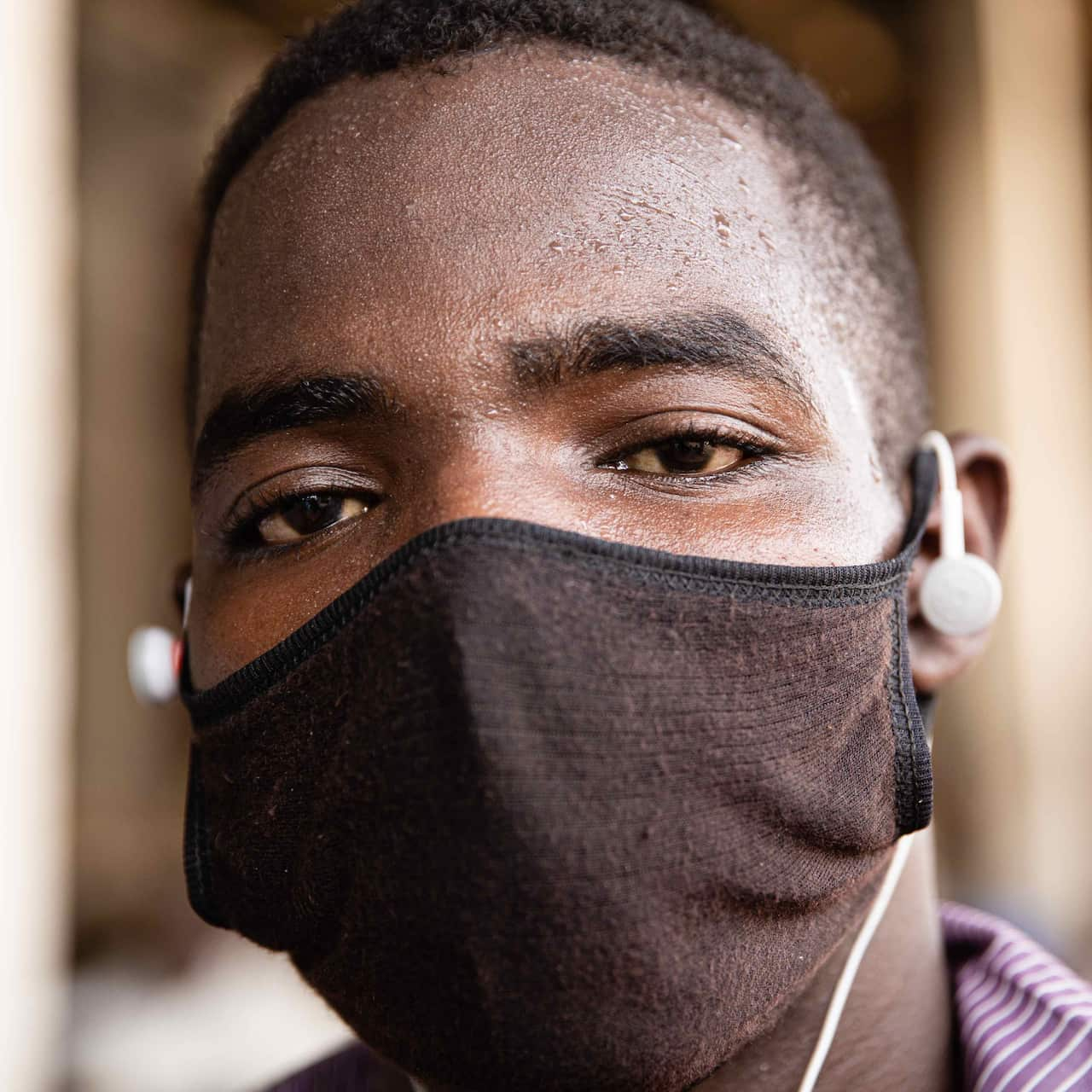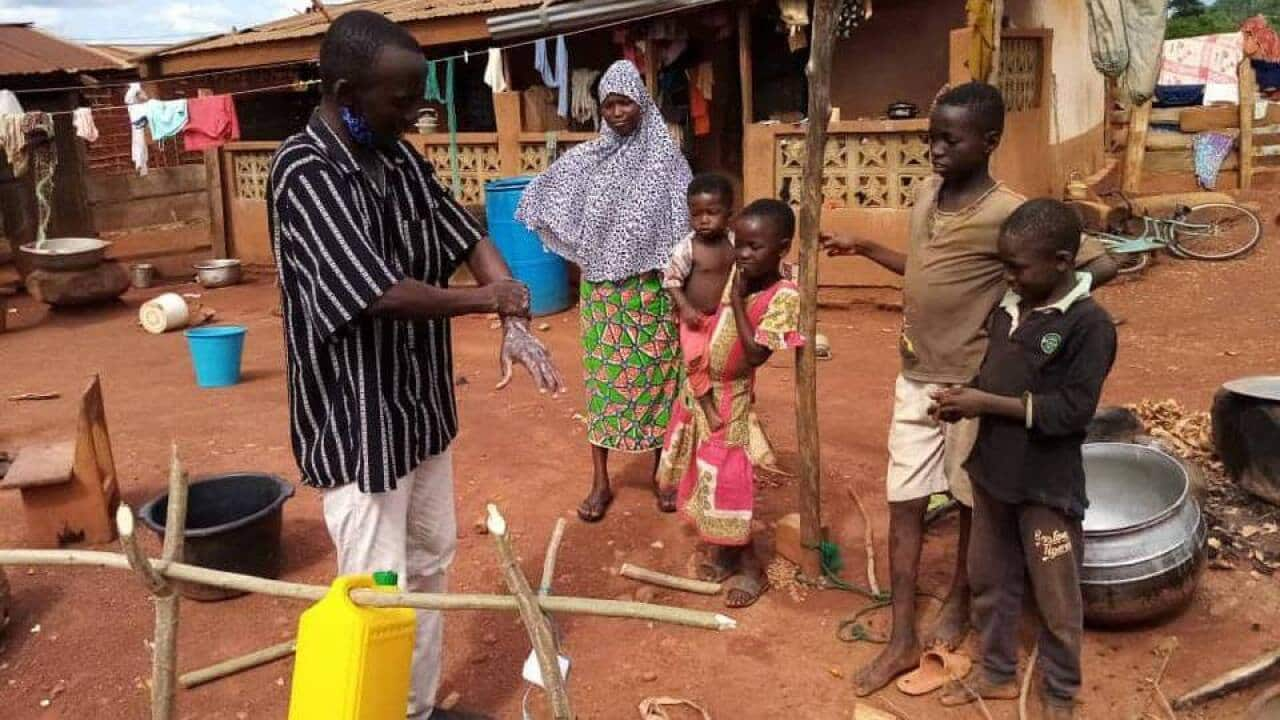That day, Muhammad did not know what to do. He was lying on his bed, his thoughts blurred.
“Why is my body not recovering? What if I have contracted … coronavirus?”
He was afraid to name the disease, although the entire world, now including his own city of Maiduguri, the capital of Nigeria’s northeast Borno State, a hotspot of conflict, was in the grips of it.
Muhammad had been feeling tired and ill for weeks. He’d initially put it down to malaria, given its season was about to start. But, this time, it was as if the treatments had no effect on him. By the time he started the third session of treatment, he could no longer ignore the possibility of COVID-19. “I said to myself, ‘What do I do now’? I stayed in my room for hours, distancing myself from my kids,” recalled Muhammad*, 45.
“I said to myself, ‘What do I do now’? I stayed in my room for hours, distancing myself from my kids,” recalled Muhammad*, 45.

Source: Alyona Synenko
“What people will think of me?”, he added, before referring to Nigeria’s Centre for Disease Control (NCDC), now leading the country’s coronavirus response. “If I call the NCDC hotline and they park the ambulance in front of the door, what will the neighbours think?”
Muhammad doesn’t want to experience what his neighbour with HIV suffered. He vividly remembers how people looked at his neighbour once they heard of his situation, how the neighbour was cut off from the broader community, left to struggle with the disease alone.
“We watched him lose weight and drift away from us. Eventually, he decided to stop his pills. He was tired of people talking behind his back. He knew that everyone knew”, said Muhammad.
Being cut off from society is the stuff of nightmares for people in a place like Maiduguri, the largest city of Borno state. Neighbours and relatives pay visits to each other’s houses daily, and life is made up of frequent social gatherings, whether at the mosque, the church or during weddings and burials.
“Reputation means a lot to people. It’s not like in other parts of the world,” Muhammad said.
In the end, as luck would have it, Muhammad's disease turned out to be malaria. As the number of COVID-19 cases continues to increase in Nigeria’s Borno state, where health facilities have already been weakened by over a decade of conflict, the population seems divided into two camps. The first doesn’t yet believe that the virus exists. The second fears they will get it – but more than the disease itself, they fear the stigma surrounding it.
As the number of COVID-19 cases continues to increase in Nigeria’s Borno state, where health facilities have already been weakened by over a decade of conflict, the population seems divided into two camps. The first doesn’t yet believe that the virus exists. The second fears they will get it – but more than the disease itself, they fear the stigma surrounding it.

Source: Alyona Synenko
Beyond Nigeria, the virus has already unleashed fearmongering and hate speech, across the globe, directed at those accused of carrying it. The shame associated with the virus and quarantine makes contact tracing more difficult, as people feel too ashamed to seek medical help. Amid the outbreak, even those conscious of the risk now find themselves paralysed by the idea of being ostracised by their neighbours and community – around whom so much of daily life revolves.
‘Some see COVID-19 as a huge monster’
Nigerian authorities have begun to address the issue of stigma, which hampers their efforts to fight the virus. In a video shared on the NCDC Twitter account, the Nigerian actress Nse Ikpe-Etim, stressed the importance of speaking up:
“Do not try to hide [the symptoms]. Otherwise, they become a danger to you and others around you.”
The International Committee of the Red Cross (ICRC), together with the Nigerian Red Cross Society (NRCS), are also publicly discussing the issue of stigma, turning to radio programs for public health messaging only days after Borno State recorded its first coronavirus case. “Some people see COVID as a huge monster; they demonise it without understanding the actual disease,” explains ICRC Nigeria spokesperson Umar Sadiq.
“Some people see COVID as a huge monster; they demonise it without understanding the actual disease,” explains ICRC Nigeria spokesperson Umar Sadiq.

Source: Alyona Synenko
“They believe that, if they get it, they are going to die away from their families.”
In one such case, Zana* stayed at home for days after developing a fever. Overwhelmed by anxiety, he couldn’t answer the phone, let alone make the trip to hospital.
While trapped at home, he was advised by friends to drink a mix of fresh ginger, onions, black seeds, and garlic – a popular myth that many still believe cures the virus, despite such claims remaining unproven. These were the only details Zana felt comfortable sharing after he’d recovered from the virus.
“He fears that you will report him to the authorities”, said one of his friends. Shame and stigma follow not just those who have the disease, but also those who have recovered.
Lack of treatment and trust
As a disease, the spectre of coronavirus looms as much in people’s minds as in their physical health. “People don’t want to say they are sick, because their neighbours will immediately think it is COVID,” said Dr Sanda of the ICRC’s health team and who has been active in radio campaigns in response to stigma and misinformation.
“Every disease carries shame and fear, but diseases with no known cure are especially stigmatised. This fear is heightened by low levels of trust in healthcare facilities.” Dr Sanda noticed that people were reluctant to speak with him about their illness until they had recovered from it. This attitude is particularly dangerous for an already frail and poorly-resourced health system that could be quickly overwhelmed by an influx of COVID-19 patients.
Dr Sanda noticed that people were reluctant to speak with him about their illness until they had recovered from it. This attitude is particularly dangerous for an already frail and poorly-resourced health system that could be quickly overwhelmed by an influx of COVID-19 patients.

Source: Alyona Synenko
To those who’ve responded to outbreaks of disease before, stigma is nothing new. In recent years, it similarly hindered the fight against the Ebola virus in several Western African countries. Some reports show that stigmatisation ran deep even after the outbreak.
According to a report published in 2018 by the US National Library of Medicine, survivors of the disease in Liberia were severely stigmatised by their communities even after recovering and returning from hospital.
Whole community stigmatised
In addition to a weakened healthcare system, the violence has left swathes of the population displaced and vulnerable, living in camps. Vulnerable populations like these face the potential of a double, deadly stigma.

Source: Alyona Synenko
In one of the camps in Maiduguri, an entire community was stigmatised after one among them contracted the virus. As soon as the news spread within the camp, the whole community was ostracised.
People stopped walking nearby the tents of the ostracised, fearful of contracting the disease. Other children ran away from those of the stigmatised community, ordered by their parents not to play with them.
“Some community members are already stigmatised and marginalised because of the conflict,” said Fumiko Nakashima, an ICRC worker in Maiduguri.
“We fear if they contract COVID-19 it will add another layer of stigma. We don’t yet know what reactions it might trigger.”
*Names have been changed.
Words by Nadera Bouazza, an ICRC spokesperson in Maiduguri, northeast Nigeria.
Photos by Alyona Synenko. The portraits feature individuals from a displaced community in Jere, on the outskirts of Maiduguri, and are deliberately anonymous.




